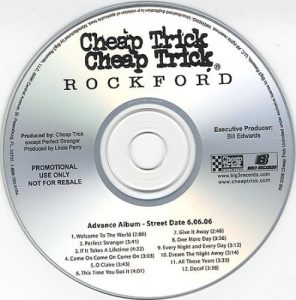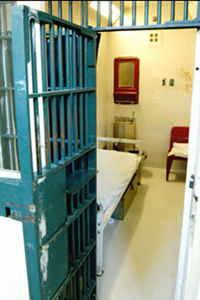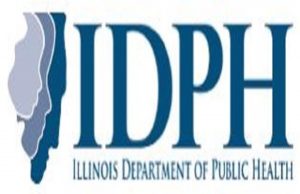SPRINGFIELD — Gov. JB Pritzker hit another roadblock with his controversial appointments to the state’s Prisoner Review Board, thanks in large part to the efforts of Senate Republicans. To date, the Senate has voted down two nominations, while another resigned and three others had their appointments withdrawn by Pritzker within the last month.
The Governor had more luck, however, pushing through a new backdoor COVID-19 mandate on teachers with the support of legislative Democrats.
In other news, the Illinois Department of Public Health is closing 10 community-based COVID-19 testing and vaccination sites, citing low demand for the services.
And April 1 is Cheap Trick Day in Illinois.
15th anniversary of Cheap Trick Day in Illinois
 State Sen. Dave Syverson (R-Cherry Valley) took a moment on the Senate floor in the Capitol April 1 to celebrate the 15th anniversary of Cheap Trick Day in Illinois.
State Sen. Dave Syverson (R-Cherry Valley) took a moment on the Senate floor in the Capitol April 1 to celebrate the 15th anniversary of Cheap Trick Day in Illinois.
Cheap Trick is an American rock band formed in Rockford in 1973 by guitarist Rick Nielsen, bassist Tom Petersson, lead vocalist Randy Hogan and drummer Bun E. Carlos. The current band lineup includes frontman Robin Zander, Rick Nielsen, Daxx Nielsen and Petersson.
“On April 1, 2007, I had the honor to sponsor and pass the resolution creating Cheap Trick Day to be honored every April 1st in Illinois,” Syverson said. “Cheap Trick has had a huge impact on music for nearly 50 years, and the band is still entertaining sold-out venues around the world. We are proud of all they have accomplished and the fact that they still call Illinois home.”
Since the creation of Cheap Trick Day in Illinois, Cheap Trick has gone on to be inducted into the Rock and Roll Hall of Fame in 2016, released three more albums, and are still touring around the world.
Another Prisoner Review Board nominee rejected
 Gov. Pritzker’s attempts to circumvent the appointment process hit a few more snags during the week as the Senate rejected one of his nominees to the Prisoner Review Board (PRB) and another nominee resigned the day the vote on his nomination was scheduled.
Gov. Pritzker’s attempts to circumvent the appointment process hit a few more snags during the week as the Senate rejected one of his nominees to the Prisoner Review Board (PRB) and another nominee resigned the day the vote on his nomination was scheduled.
On March 28, Pritzker nominee Oreal James submitted his resignation from the board. Later in the evening, nominee Eleanor Wilson received only half the required number of votes from the Senate she needed to be confirmed.
The PRB is made up of 15 members appointed by the Governor. A primary purpose of the Board is to determine if certain individuals should be released from prison. Because of changes in sentencing laws decades ago, most of the prisoners who come before the PRB are those who were convicted of very serious, usually violent offenses.
During his nearly four years in office, the Governor had been gaming the Constitutional process for making appointments to the PRB. Appointees are supposed to be approved by the Senate within 60 days of their nomination by the Governor. Pritzker, however, had been appointing individuals to the board and then withdrawing those nominations before the 60 session-day deadline, often reappointing them days later. Both Oreal James and Eleanor Wilson were initially appointed on April 2, 2019, then withdrawn on March 23, 2021. Pritzker reappointed them both on March 25, 2021.
In fact, only one PRB appointee has been successfully confirmed by the Senate since Pritzker took office, and that nominee was appointed by the previous Governor.
In the meantime, Pritzker’s nominees were serving, taking votes on whether to release inmates, and drawing nearly six-figure annual salaries. During Pritzker’s time in office, the members of the PRB have been voting to release a much higher percentage of inmates, including several individuals convicted in notorious murder cases.
Members of the Senate Republican Caucus have worked tirelessly to raise public awareness of the issues within the PRB, hosting numerous press conferences, and repeatedly calling for confirmation votes on the nominees. After more than a year of continued pressure from legislators, the Senate finally began taking up the Governor’s pending nominations during the last two weeks.
During the previous week, the Senate rejected the nomination of Jeffrey Mears, while the Governor withdrew another nominee, Max Cerda. Cerda himself was a convicted double murderer who was released in 1998. Cerda generated further controversy this year as a member of the PRB when he voted in favor or releasing a convicted cop-killer he had served time with.
Pritzker had also withdrawn the nominations of Arthur Mae Perkins and Joseph Ruggiero hours before a Senate Executive Committee hearing on March 8 when their nominations were scheduled to be heard.
Syverson says the Governor should rethink his approach to the process and nominate individuals who would appeal to a bipartisan majority of the Senate. He says the Senate is more than willing to approve qualified candidates to the PRB who will serve the interests of the people of Illinois.
New COVID-19 legislation for teachers
 During the week, the Senate narrowly passed Pritzker’s new proposal designed to help teachers who have been vaccinated and punish those who haven’t been vaccinated.
During the week, the Senate narrowly passed Pritzker’s new proposal designed to help teachers who have been vaccinated and punish those who haven’t been vaccinated.
Last fall, the General Assembly passed by overwhelming majorities bipartisan legislation to help teachers who had a run out of sick time due to very strict state quarantine rules for COVID-19 exposure. Despite the strong support from lawmakers and teachers themselves, the Governor took it upon himself to veto the popular bill and instead ram his own proposal through the legislature.
The Governor’s proposal, House Bill 1167, retroactively restores already-used sick days to teachers who missed work during the 2021-2022 school year due to COVID-19 rules. The legislation has one big catch, however – it only applies to teachers who are fully vaccinated.
Teachers will have until five weeks after the effective date of the legislation to receive the required doses to be considered fully vaccinated. The legislation would take effect immediately once signed into law. The first and second doses of the Pfizer and Moderna vaccinations are recommended to be given 3-4 weeks apart, meaning teachers would have to act soon once the bill is signed.
Critics of the legislation have called it a “backdoor vaccine mandate” and many are left wondering why it is necessary as the pandemic is ending.
Syverson says that it’s not fair to pit teachers against each other by giving different benefits based on their vaccination status.
COVID-19 testing sites closed
 Illinoisans in several communities have lost an option for COVID-19 testing and vaccination as the Illinois Department of Public Health has closed 10 community-based testing sites. The Department says the closures are due to declining demand as the pandemic wanes.
Illinoisans in several communities have lost an option for COVID-19 testing and vaccination as the Illinois Department of Public Health has closed 10 community-based testing sites. The Department says the closures are due to declining demand as the pandemic wanes.
The testing sites officially closed on March 31, as did the vaccination clinics housed at those locations.
Impacted communities include Arlington Heights, Aurora, Bloomington, Champaign, Fairview Heights, Peoria, Rockford, South Holland, Waukegan, and Chicago’s Harwood Heights neighborhood.

